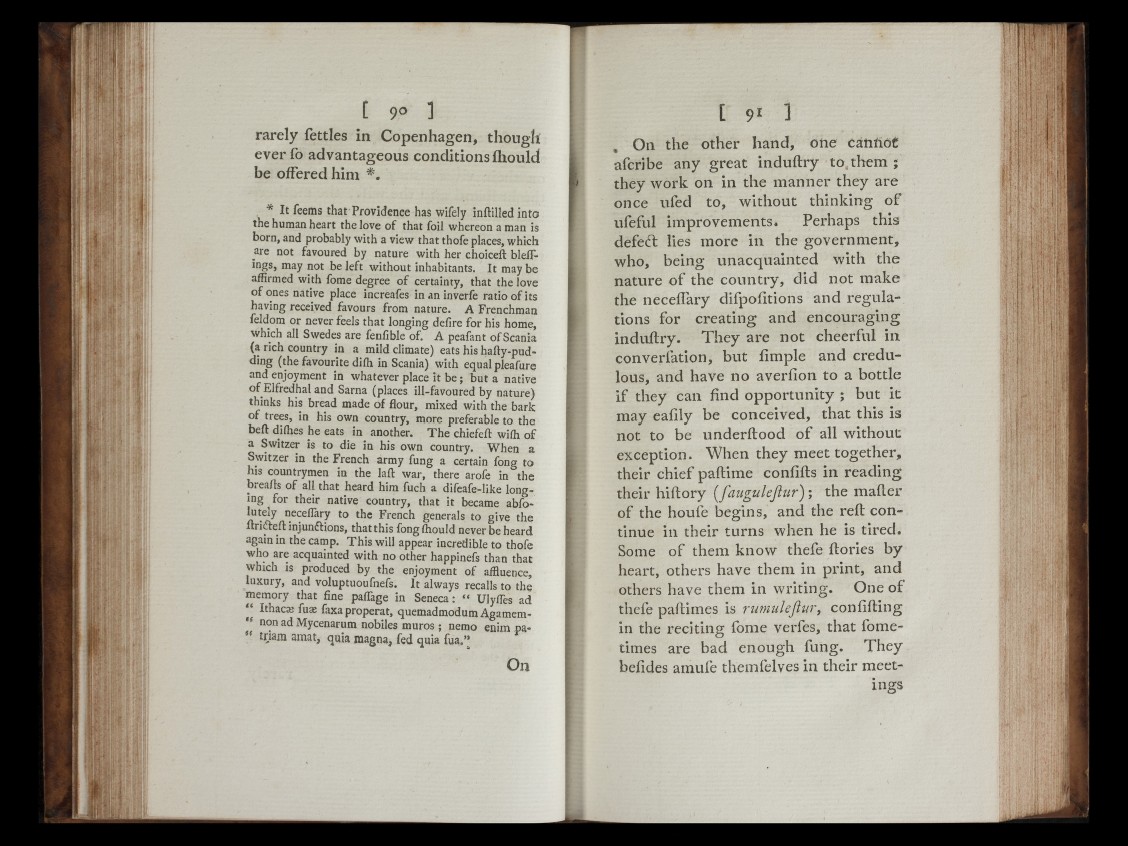
1:
rarely fettles in Copenhagen, though
ever fo advantageous conditions fliould
be offered him *.
* It feems that Providence has wifely inftilled into
the human heart the love of that foil whereon a man is
born, and probably with a view that thofe places, which
are not favoured by nature with her choiceft bleif-
ings, may not be left without inhabitants. It may be
affirmed with fome degree o f certainty, that the love
o f ones native place increafes in an inverfe ratio o f its
having received favours from nature. A Frenchman
feldom or never feels that longing defire for his home,
which all Swedes are fenfible of. A peafant o f Scania
(a rich country in a mild climate) eats his hafty-pud-
ding (the favourite diih in Scania) with equal pleafure
and enjoyment in whatever place it b e ; but a native
o f Elfredhal and Sarna (places ill-favoured by nature)
thinks his bread made of flour, mixed with the bark
o f trees, in his own country, more preferable to the
beft diihes he eats in another. The chiefeft wiih o f
a Switzer is to die in his own country. When a
Switzer in the French army fung a certain fong to
his countrymen in the laft war, there arofe in the
breafls o f all that heard him fuch a difeafe-like longing
for their native country, that it became abfo-
lutely neceifary to the French generals to give the
ftriéfeft injunftions, that this fong ihould never be heard
again in the camp. This will appear incredible to thofe
who are acquainted with no other happinefs than that
which is produced by the enjoyment o f affluence,
luxury, and voluptuoufnefs. It always recalls to the
memory that fine paifage in Seneca: “ Ulyifes ad
“ Ithacm fa x faxa properat, quemadmodum Agamem-
non ad Mycenarum nobiles muros ; nemo enim pa-
“ triam amat, quia magna, fed quia fua.’’
On
On the other hand, one caiiiiot
afcribe any great induilry to.them ;
they work on in the manner they are
once ufed to, without thinking o f
ufeful improvements. Perhaps this
defetff lies more in the government,
who, being unacquainted with the
nature o f the country, did not make
the neceffary difpoiitions and regulations
for creating and encouraging
induilry. They are not cheerful in
converfation, but iimple and credulous,
and have no averiion to a bottle
i f they can find opportunity ; but it
may eafily be conceived, that this is
not to be underitood o f all without
exception. When they meet together,
their chief paftime coniifts in reading
their hiftory ffaiigulejliir'); the mailer
of the houfe begins, and the reft continue
in their turns when he is tired.
Some of them know thefe ftories by
heart, others have them in print, and
others have them in writing. One o f
thefe paftimes is riimulejiiir, coniifting
in the reciting fome verfes, that fometimes
are bad enough fung. They
befides amufe themfelves in their meetings